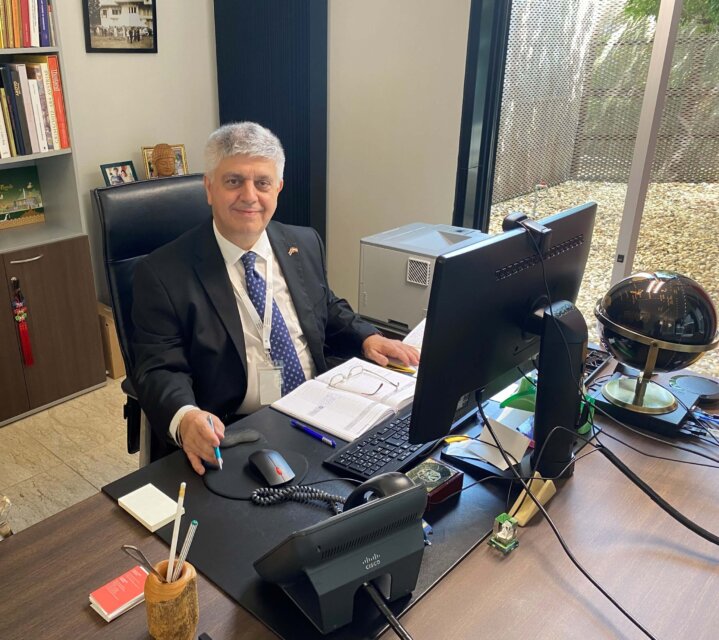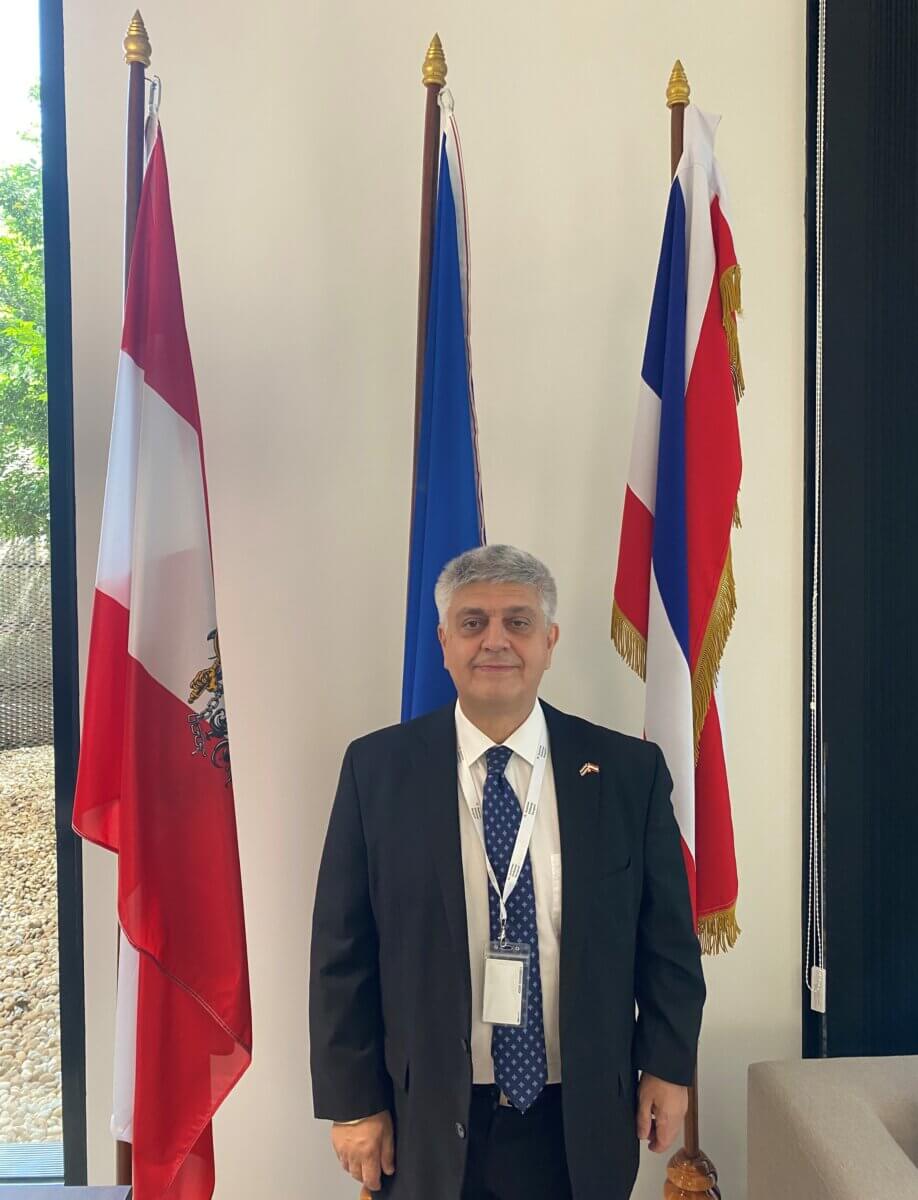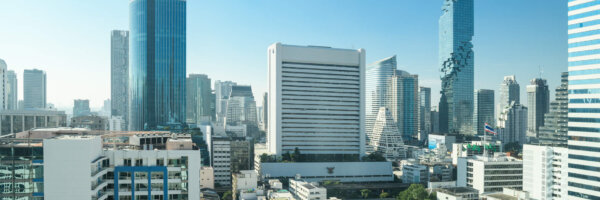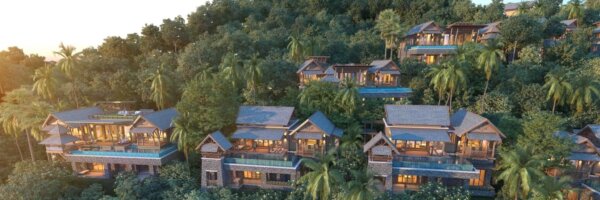
H.E. Mr. Wilhelm Donko The Austrian Ambassador to Thailand
In 2019, the cordial relations between the Kingdom of Thailand and the Republic of Austria reached 150 years milestone. Expat Life sat down with H.E. Mr. Wilhelm Donko, the new Austrian Ambassador who arrived Bangkok in April this year. Ambassador Donko, together with Spouse, Madame Yan Donko. came directly from Oslo, Norway, where the diplomatic couple spent five years since 2017. Before that he was in Vienna for four years, and before that Ambassador in Manila and in Seoul.
Which city were you born and brought up?
The Donko’s family origin is in Southern Bohemia. I was born in Upper Austria’s capital of Linz on the river Danube, but brought up in Schaerding, a picturesque town in Upper Austria with a population of only 6000, directly on the border to Bavaria. A small but very beautiful baroque town which I would strongly recommend everybody to visit during a holiday in Austria.
At which age did you decide you wanted to become a diplomat?
When I was nearly 29 years old, I never thought about this job. However, It was only in Tokyo, where I was a postgraduate student in the late 1980s. I met my wife Yan, from Shanghai and was also a student at Tokyo University. I was looking for a job and as I always had been very interested in politics, history, geography etc., I thought then why not tried it?
Do you have any other diplomats in your family?
No, never; my father was an architect, my mother an office employee and later a housewife.
How do you see Thailand today, in ASEAN, and in a wider context?
Thailand is traditionally one of Austria’s most important partners; not only in the region, but in all Asia. We are also well aware that Thailand occupies a key position in the Association of South East Asian Nations (ASEAN), the founding document of this organization was signed in Bangkok in 1967. Like Thailand, Austria supports the struggle to uphold multilateralism in a climate of growing protectionism and rising great power competition. Bilaterally, we established formal diplomatic relations between Austria-Hungary and the Kingdom of Siam already in 1869 with the conclusion of a treaty on “Friendship, Trade and Navigation”; but already before the signature of this treaty, in 1865, we had opened the first honorary consulate in Bangkok. In 1872, i.e. exactly 150 years ago, the first Austrian ambassador presented his credentials to His Majesty King Chulalongkorn (Rama V) who later visited Emperor Franz Joseph I in Vienna, in 1897. In 1912 we had opened a resident embassy (a so-called legation) in Bangkok. I would also like to mention that we had been especially honored by diplomatic assignments and various visits of the Royal Family in Austria.
Do you see any similarities between your country and Thailand?
At first glance we are geographically far apart and very different, but at the end we must have some important similarities. Tourism is an important source of revenue for both countries and accounts for approximately 12% of both our GDPs, which means that hospitality is important for both of us. The comfortable ambience, the congeniality and coziness coming from the people is something, that I would see as a clear similarity between our two countries. In German we have the word “Gemuetlichkeit”, which means more than sociability or comfortableness and which I would define as a kind of modus vivendi, a way of living which is practiced in Thailand on all levels and in all situations.
Do you have children, if so at what age and where do they go to school, university or work?
Yes, we have two children, Wilhelm, born in 1993 and a daughter, Katharina, who was born in 1998. Our son is currently in Japan, at Waseda University together with his girlfriend Melanie who is at Meji University; and our daughter is in Copenhagen, at CBS (Copenhagen Business School).
How do you look upon your work here? How does an average day look like?
Since my arrival I made a large number of courtesy calls and was therefore out of my office very frequently. There is no classical “average day” in this job. After a local EU meeting or a visit to introduce myself to an important partner I might have to go somewhere outside of Bangkok to attend a ceremony at a new Austrian production plant or to deliver a speech somewhere at a school or university; in the evening I have to attend a lot of social events, together with my wife. Every day is different, there is no consistent order how a working day looks like.
Have you set some goals you really would like to fulfill before you leave Thailand?
My goal is to represent Austria in Thailand in the best possible manner. I will do my outmost to strengthen and improve our bilateral relations in all fields, to support the Austrian community here and to improve our economic relations, which are already developing very well. We have approximately 100 Austrian companies doing business in Thailand, a quarter of them are benefiting from the favorable investment opportunities and have production plants here. In a rough calculation with my commercial counselor we estimated that Austrian companies in Thailand provide currently jobs for more than 10.000 Thai workers directly and many more indirectly. Austrian expertise in the field of crystal cutting and jewelry, in railway technology as well as in vocational training and higher education – to mention just a few – are prominent examples of successful collaborations between Austria and Thailand which I would like to promote further. I think in my job it is not always helpful to define a certain goal or certain numbers, my overall goal is clearly defined in the first sentence of my answer already.

Have you managed to travel in Thailand yet?
Not so much as I had wished to do, but we were able to make some trips, including to Phuket, on the road and to some nearby places. Nevertheless, we know Thailand from many visits before. My first visit to Thailand took place in 1986, as a student with a backpack.
When you have a day off, what do you prefer to do? A hobbies or pastimes?
I have a hobby and it is a very intense and time-consuming one: I am very much interested in naval history. I wrote two dozen of books and many articles on this topic since the late 1970s, mainly on Austro-Hungarian naval history, but also on the U.S. Navy and – to a smaller extend – on Japanese and German naval history too. It might be a surprise to many readers that Austria, today a landlocked country, once had a navy and even a quite important one. I do not speak about the river Danube or Alpine lakes. Austria-Hungary had access to the Mediterranean (from 1382 to 1918) and was home of the 6th-largest navy in Europe in 1914, only England, Germany, France, Italy and (with some restrains) Russia had larger naval forces; outside Europe only the USA and Japan; in 1914 the Austria navy was the 8th-largest in the world. You would not think about it today, most people are associating Austria with music, Mozart, skiing, mountains, “Sound of Music” …. but wait! Wasn’t there a Captain von Trapp in this movie? Wasn’t he a naval officer? In Salzburg, in the Alps? Yes, Georg von Trapp, the main character in “Sound of Music”, was indeed a historical person; he had been a very successful Austrian submarine commander in World War One. Austria’s navy built also its own Dreadnought-battleships. And there were also many visits of Austrian warships to Siam between 1869 and the First World war and I was doing a lot of research work on all these visits too. So, to answer your question, I spend most of my free time in research work on naval history.
How many of your countryfolk are living in Thailand? When and why did Thailand become a desirable destination for your people?
A very difficult question, as we indeed encourage our national citizens to register at the embassy, but there is no legal obligation to do it. We often hear from Austrians in trouble, who come to the embassy or who simply need a certain document, that they had been living in Thailand for many years already, without any tracks or registration at the embassy. Some others spend a couple of months per year in Thailand, mainly in wintertime, the rest of the year in Austria; and COVID also changed a lot. Our guess is, that approximately 3,000 or more can be considered as living here in Thailand.
Does your country and Thailand have an exchange programme for students?
No, there is no specific exchange programme for students from Thailand or vice versa. The “OeAD – Agency for Education and Internationalization” in Vienna is the most important government institution for advising, supporting and connecting people in education, science, research and culture with various future-oriented programmes worldwide. I also would like to mention the ASEA-UNINET, a network which was founded in 1994 by Austrian and South-East Asian universities, including Thailand, as an association of European and regional universities.
Any fun moment from Thailand that you’d like to tell us about?
There are fun moments every day, 24/7, no dull moments. Actually, it is fun every moment of the day to live in Thailand. Not everything is so serious as in other countries, if something does not work today, maybe tomorrow. Let’s see. As a European who was born North of the Alps, it is very nice to get used to that approach.
Do you regularly meet up with your community?
Yes, I try to meet the Austrian community wherever possible and I do my best to give them the feeling that the embassy and its staff is here for them. After the long COVID break, we have again personal meetings of our business community, we already had a so called “Heurigen”, a big wine festival and various other occasions to meet. As it stands now I am also very confident that we will be able to have this year again a national day reception, on October 26, and I am very grateful for that.



